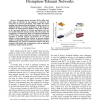Free Online Productivity Tools
i2Speak
i2Symbol
i2OCR
iTex2Img
iWeb2Print
iWeb2Shot
i2Type
iPdf2Split
iPdf2Merge
i2Bopomofo
i2Arabic
i2Style
i2Image
i2PDF
iLatex2Rtf
Sci2ools
105
click to vote
ADHOC
2008
2008
MORA routing and capacity building in disruption-tolerant networks
Disruption-tolerant networks (DTNs) differ from other types of networks in that capacity is created by the movements of network participants. This implies that understanding and influencing the participants' motions can have a significant impact on network performance. In this paper, we introduce the routing protocol MORA, which learns structure in the movement patterns of network participants and uses it to enable informed message passing. We also propose the
Related Content
| Added | 08 Dec 2010 |
| Updated | 08 Dec 2010 |
| Type | Journal |
| Year | 2008 |
| Where | ADHOC |
| Authors | Brendan Burns, Oliver Brock, Brian Neil Levine |
Comments (0)

